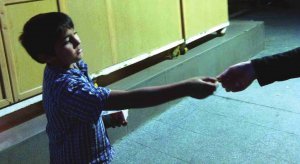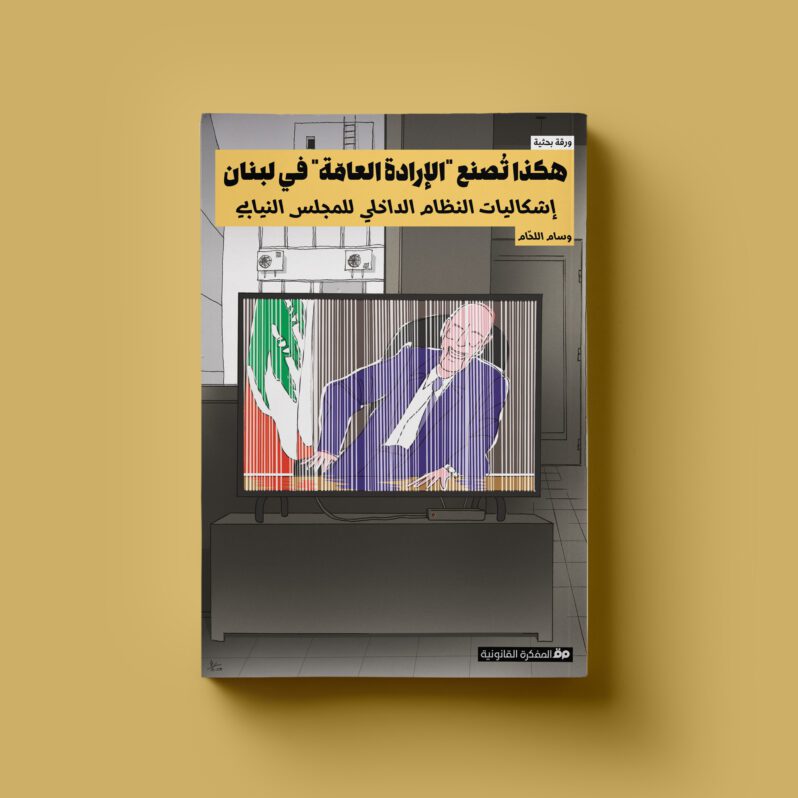Lebanon’s Human Trafficking Law: Serving or Penalizing Vulnerable Groups?

In 2011, a Lebanese law was passed to criminalize human trafficking and as a result new articles were added to the Penal Code. For the first time in Lebanon, the exploitation of others became punishable by law. However, a recent application of the law raises rather than assuages concerns over who does the law benefit.
The Legal Agenda has obtained the files of two claims of human trafficking that are pending at the Criminal Court in Beirut. The two claims were based on ascendants forcing their children to engage in begging. However, judicial authorities examining the two cases (the Public Prosecutor’s office at the Appeal Court, the investigating judge, and the court’s indictment division) have unanimously labeled these actions as human trafficking. Thus, they considered them crimes pursuant to Article 586, which has been added to the Penal Code under the abovementioned law.
According to Article 586, human trafficking is punishable by imprisonment of ten years and a fine if the offender is “one of the victim’s parents”. It is noteworthy that judicial authorities have been cautious in their enforcement of articles relating to human trafficking. Yet, the latter is being invoked in this case even when it was possible to consider the act in question as an offense under another article in the Penal Code, namely, Article 618. This article states that forcing minors to beg is punishable by imprisonment for up to 2 years.
In effect, a number of judges have unanimously agreed to consider the act of sending minors to beg as human trafficking, despite the significant difference between the 2 in terms of the consequences and the punishment incurred. In this sense, examining these 2 cases can shed light on how judges in Lebanon are approaching human trafficking crimes.
Facts of First Case
The first case arose when an investigative detachment in Beirut arrested two Syrian minors at around 8pm in late November of 2012. The two minors were selling chewing gum and begging in the streets of Beirut. The security forces summoned their mother for investigation “to find out why they were sent into the street”. The mother stated that she has four children, has a chronic disease, walks on crutches, and is married to a Syrian man who suffers from a “herniated disc” and does not work. “Hunger and the difficult financial situation led me to send my sons to the streets to sell chewing gum so that we can buy bread,” she said.
Based on her statement, the Appeals Attorney General in Beirut decided to keep the mother in custody, hand over the two minors to a social welfare organization, and pursuant to the provisions of Article 26 of the Juvenile Law, refer the case to the Beirut magistrates (qadi munfarid) who looks into juvenile misdemeanor cases. The mother was later questioned by the investigative judge in Beirut on why she forced her sons to beg. She told the judge that she and her husband are too sick to work. “Because we are poor and unable to pay the rent for the room we live in, the two boys went out to beg to pay for the rent. We are very poor and cannot return to our town of Jisr al-Shughur in Syria because of the security situation there.”
According to the investigative judge’s bill of indictment, the indictment division charged the defendant with human trafficking, issued an arrest warrant against her, and referred her to the Criminal Court in Beirut for trial. Taking into account evidence presented to it, the indicting body argued that the defendant “used her parental authority to force the 2 minors to beg in the streets late into the night under the guise of selling chewing gum. [She] exploited them to make money when they are at an age in need of care”.
Moreover, the indicting body said that the mother’s statement on the health condition of her husband and herself “does not absolve her of criminal responsibility”. Meanwhile, the claim about not being able to return to Jisr al-Shughur was considered “an attempt to suggest that the family was forced to leave their country because of the security situation there, when they actually have been living in Lebanon since 2006, as evidenced by a court verdict against (the mother) in that year” (Note: The case file did not specify the offense referred to above; also the file did not refer to the Public Security Department’s entry stamp dated June 16, 2012 on the defendant’s identity card).
After the court appointed a lawyer for the defendant upon the latter’s own request, she stated during questioning before the Criminal Court that she was not aware that her children were selling chewing gum on the street, and that she thought they were going to play electronic games.
Facts of Second Case
The second case at hand arose on January 17 of this year. On that day, an investigative detachment arrested 4 minors who were selling chewing gum and begging on the streets of Beirut. They were accompanied by the mother of one of them. Accordingly, the mother of two of the minors was interrogated because she was present with them in the street. The mother said she was in a public street begging with the children because of their difficult economic condition. She also said that her husband was dead.
The parents of the other minors (and some of their relatives) were interrogated. They said they fled Syria about a month ago due to the security situation there. One minor’s mother said that her husband was dead and that she works as a house cleaner. She said that her son does not beg but rather sells chewing gum because of their hard living conditions in order to get “our daily bread”. The brother of one minor said that the latter joins the neighbors’ children to sell chewing gum out of his own will and that no one has asked him to do so. He noted that his brother (the minor) “used to pursue his studies in Syria”.
The minors were handed over to a social welfare center and the Appeals Public Prosecutor in Beirut referred the case to the Beirut magistrate who looks into juvenile misdemeanor cases. The Attorney General also decided to hold the parents of 3 of the minors (the fourth minor’s brother, mother, and father were not detained because they were in Syria), and referred them to the investigating judge where they all repeated the same statements they had made during the initial investigation. One of them added that he was not aware that the minor was working outside the house. They all denied the charge of trafficking with their children leveled against them.
The indicting body reached a similar conclusion to that of the investigating judge. It deemed the three defendants guilty of human trafficking and stressed that they should stand trial before the Criminal Court. It also considered that each of the three defendants “trafficked their minor son, taking advantage of parental authority to participate with the son in begging at night under the guise of selling chewing gum”.
Conclusion:
The judicial bodies mentioned above seem to have hastily applied the Human Trafficking Law to the cases in question, and qualified the acts presented to them in a manner that would ensure they receive the most severe punishment. These judicial bodies deemed the act of pushing children to beg as a human trafficking crime, and not a misdemeanor.
It is quite telling that the law criminalizing human trafficking was first applied to Syrian mothers who pushed their children to beg out of need, as is the case with most refugees. In such cases, begging was not motivated by the desire to become rich or engage in human trafficking, rather, it was motivated by the need to survive where parents and children alike were victims of poverty, need, and perhaps force majeure.
Therefore, punitive measures are out of place. What makes the matter even more unusual is the fact that the two case files examined did not include any interrogation of the minors, nor did they refer to any statement about what they went through. There is no suggestion or insinuation that the defendants were part of a gang. Nor is there an examination of the type of exploitation involved or the extent of the families’ poverty – including whether they have another actual or potential source of income.
It is thus legitimate to wonder whether the judges’ harsh attitude was motivated by the judicial system’s serious commitment to confront all forms of exploitation, or whether it was a reaction to the growing number of Syrian refugees. The latter would be no different from similar instances. These include campaigns carried out by several municipalities to prevent Syrian refugees from gathering or moving freely in the country (e.g. Lebanese soldiers beating Syrian workers in Beirut’s district of al-Ashrafiya late last year, the undressing, harassing, beating, and abusing of some Syrian citizens by the municipality of Dekwaneh and the mayor’s cover up that followed).
What makes the question even more pressing is the fact that the judges’ harsh approach in the 2 cases has affected one of the most vulnerable social groups, while the gangs involved in human trafficking are well known to the security agencies and could have been pursued once the law came into force. The opposite seems to have taken place. Citing the “look of innocence” on the face of a 9-year-old girl, an investigating judge has recently barred the trial of the girl’s father charged with human trafficking for allowing her to dance for a customer at a nightly venue in Beirut.
In sum, it was necessary to establish a legal framework to protect human trafficking victims, particularly children. However, the introduction of legal texts detached from social or economic realities, and the absence of engaging in a public debate about who these texts aim to protect, may result in defeating the purpose of the law. The law turns from being a tool to protect the weakest most vulnerable groups into one more instrument of punishing them for their poverty.
This article is an edited translation from Arabic.



